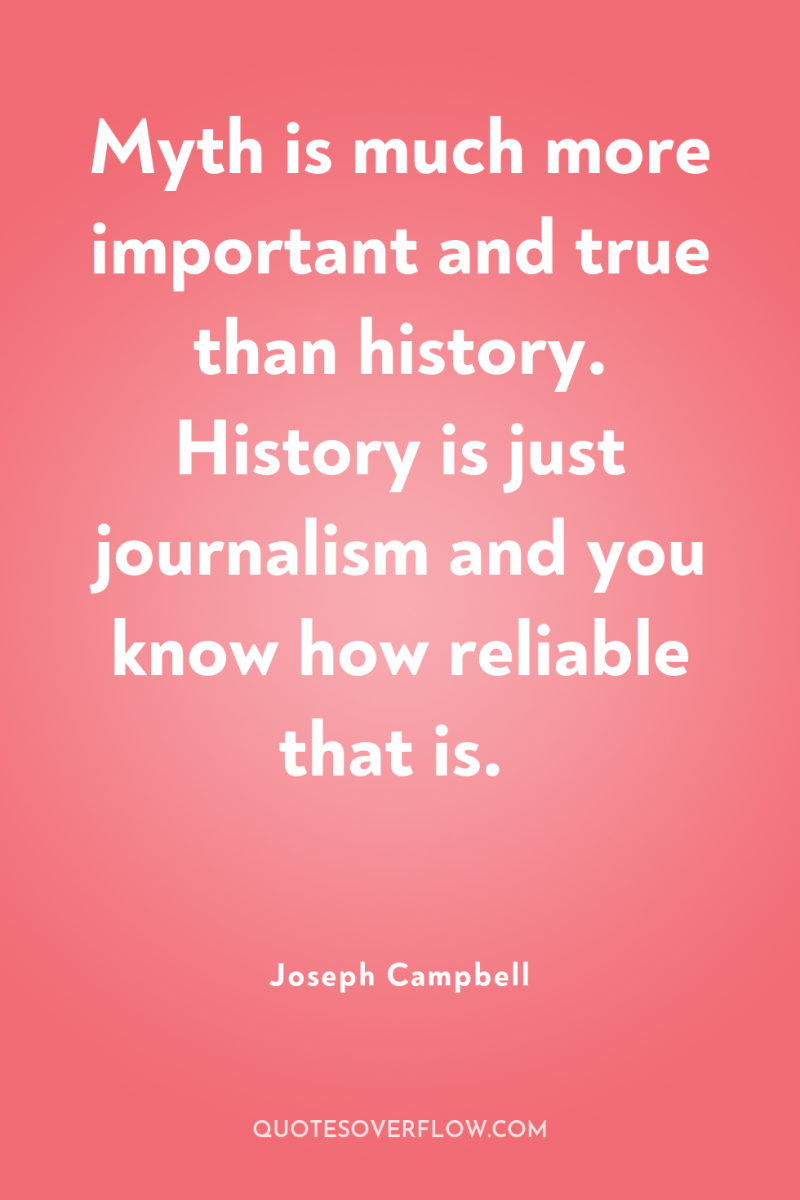
1
Myth is much more important and true than history. History is just journalism and you know how reliable that is.Joseph Campbell
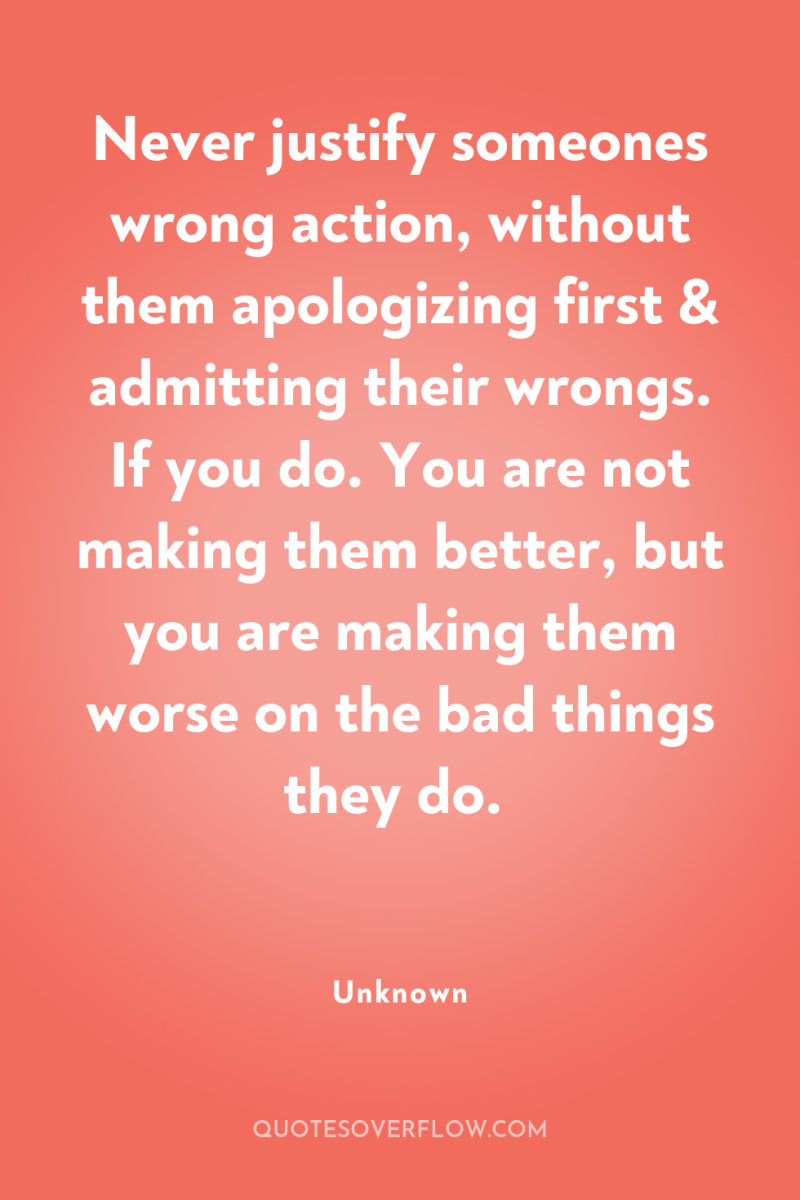
2
Never justify someones wrong action, without them apologizing first & admitting their wrongs. If you do. You are not making them better, but you are making them worse on the bad things they do.Unknown
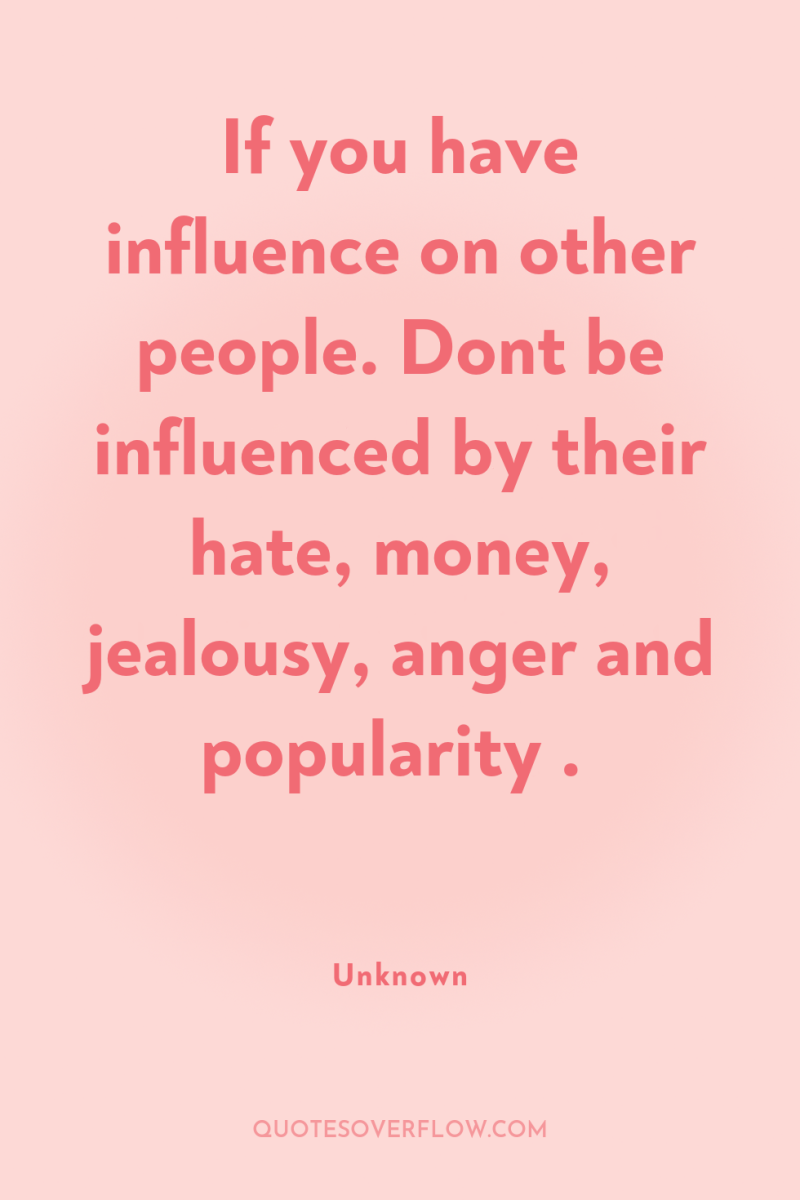
3
If you have influence on other people. Dont be influenced by their hate, money, jealousy, anger and popularity .Unknown
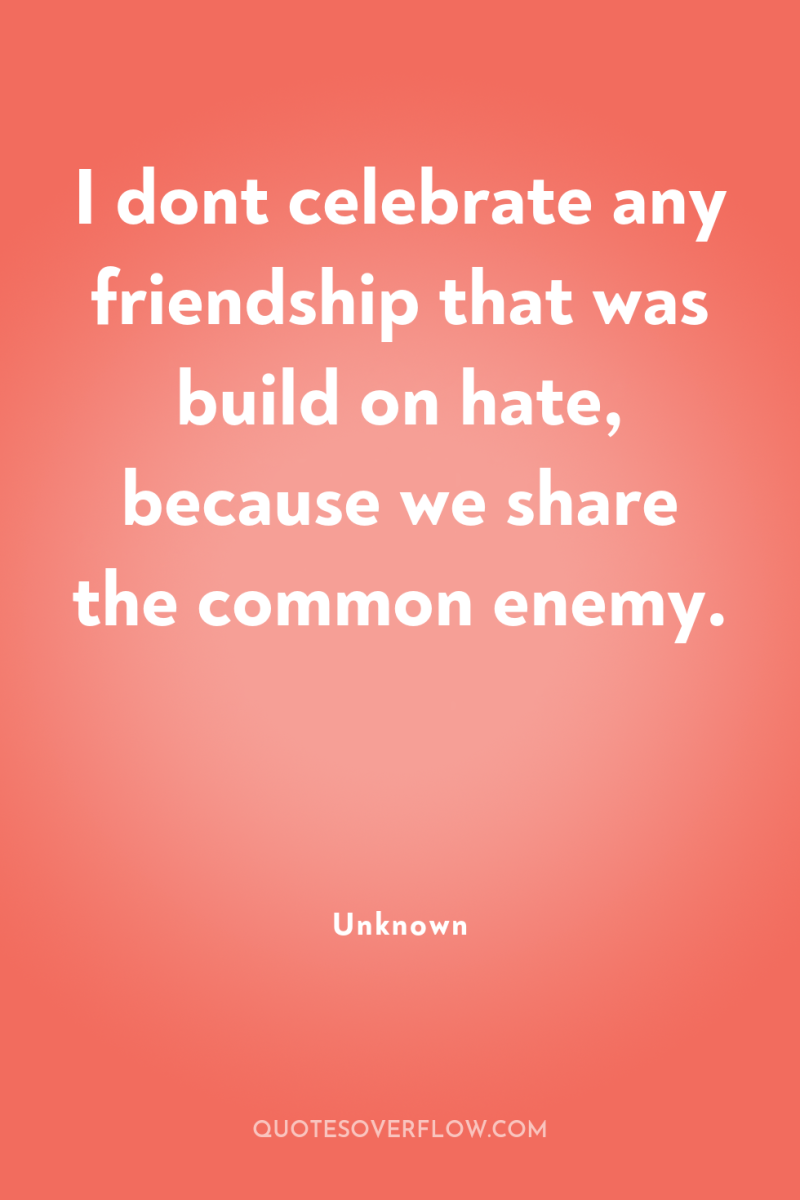
4
I dont celebrate any friendship that was build on hate, because we share the common enemy.Unknown
5
Children are no longer being parented, but are raised. Thats why they don't have morals, ethics, humanity and manners, because their parents neglected them. We now live in a society that doesnt care about right or wrong.Unknown
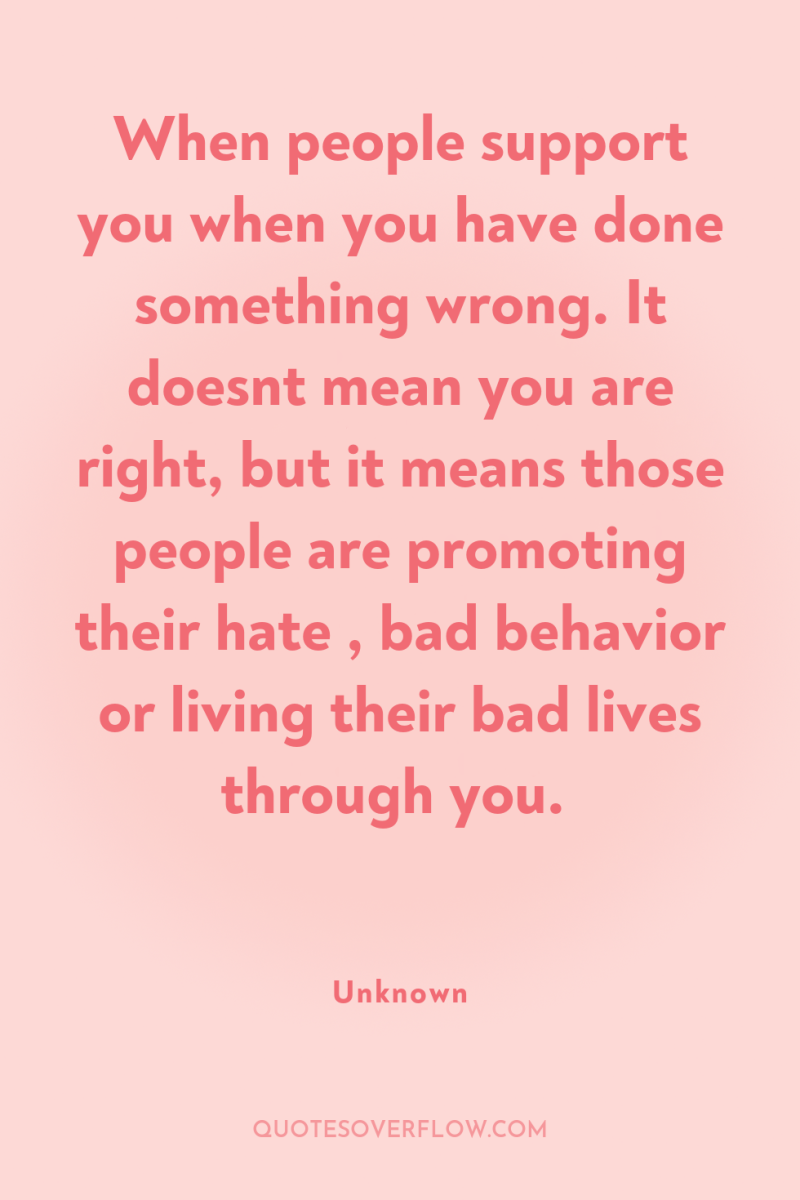
6
When people support you when you have done something wrong. It doesnt mean you are right, but it means those people are promoting their hate , bad behavior or living their bad lives through you.Unknown
7
I was winning awards, getting raises, lecturing college classes, appearing on TV shows, and judging journalism contests. And then I wrote some stories that made me realize how sadly misplaced my bliss had been. The reason I'd enjoyed such smooth sailing for so long hadn't been, as I'd assumed, because I was careful and diligent and good at my job.. The truth was that, in all those years, I hadn't written anything important enough to suppress. .Gary Webb
8
Sherman Reilly Duffy of the pre- World War I CHICAGO DAILY JOURNAL once told a cub reporter, 'Socially, a journalist fits in somewhere between a whore and a bartender. But spiritually he stands beside Galileo. He knows the world is round.' Well, socially I fit in just fine between the whore and the bartender. Both are close friends. And I knew the world was round. Yet, as time went by I found myself confronted with the ugly suspicion that the world was, after all, flat and that there were things dark and terrible waiting just over the edge to reach out and snatch life from the unlucky, unwary wanderer.Jeff Rice
9
There is nothing to fear except the persistent refusal to find out the truth.Unknown
10
I imagined it was far better to be optimistic, to proceed assuming wherever you could that you had cared enough, that you'd made a difference, that you would again. Dwelling on the worst was no way to live.Gwenda Bond
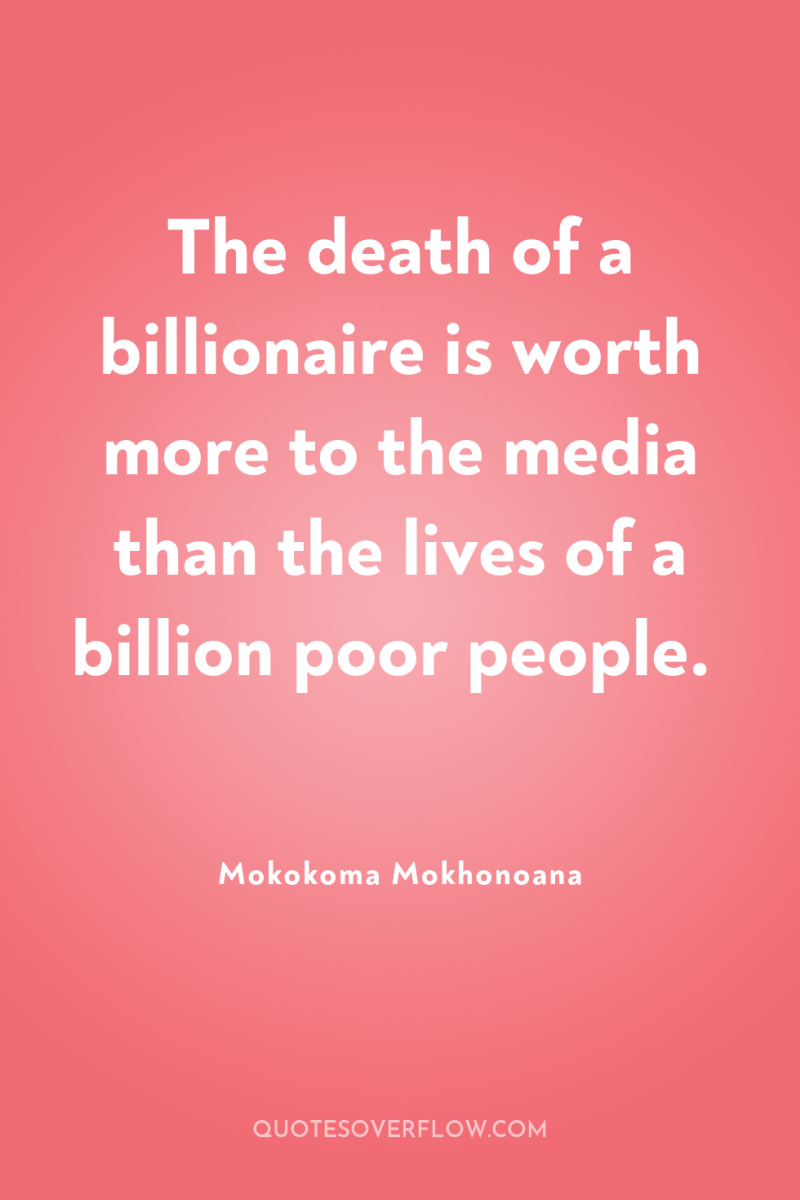
11
The death of a billionaire is worth more to the media than the lives of a billion poor people.Mokokoma Mokhonoana
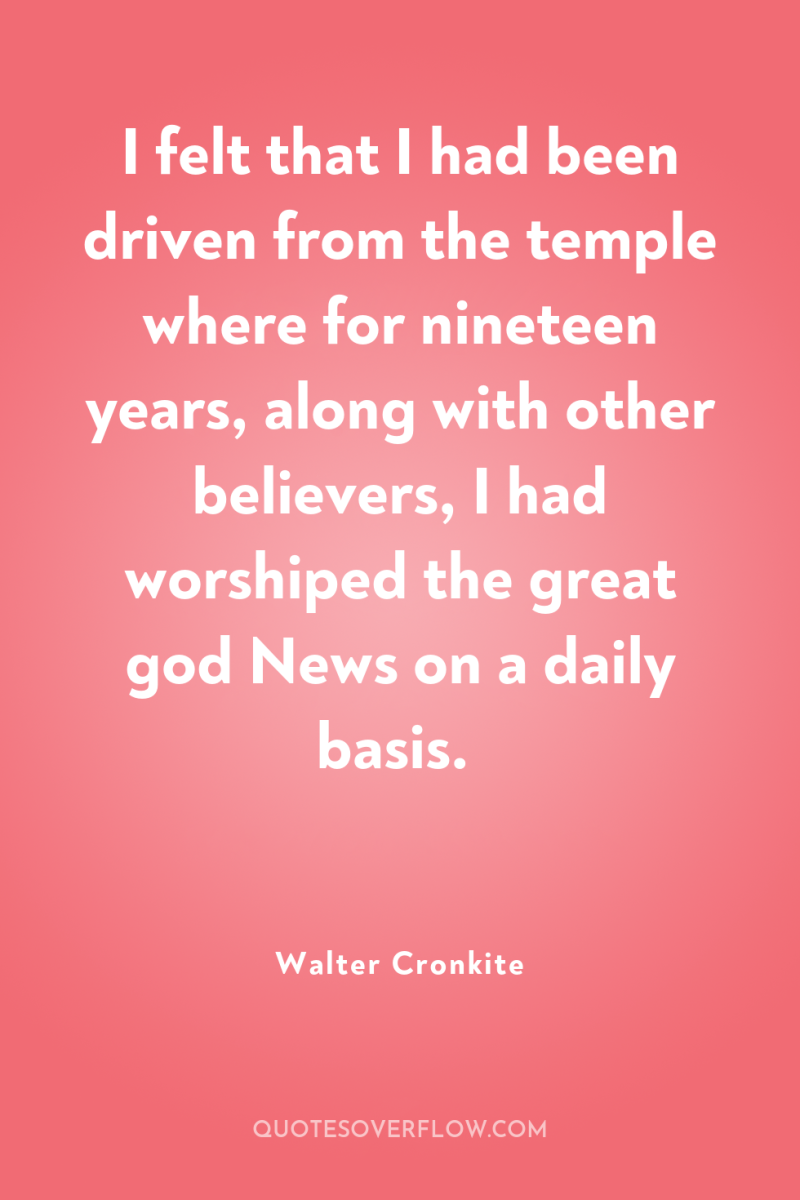
12
I felt that I had been driven from the temple where for nineteen years, along with other believers, I had worshiped the great god News on a daily basis.Walter Cronkite
13
Better a good journalist than a poor assassin.JeanPaul Sartre
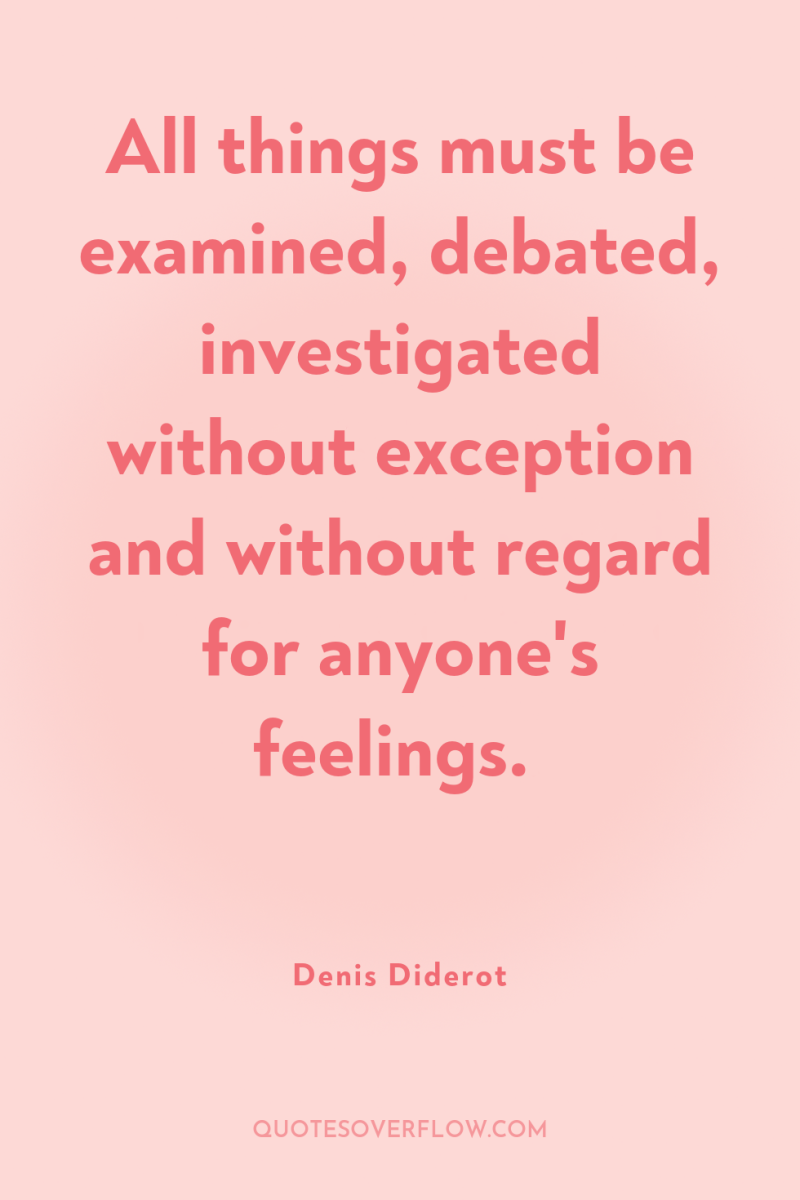
14
All things must be examined, debated, investigated without exception and without regard for anyone's feelings.Denis Diderot
15
But my way of writing is rather to think aloud, and follow my own humours, than much to consider who is listening to me; and, if I stop to consider what is proper to be said to this or that person, I shall soon come to doubt whether any part at all is proper.Thomas De Quincey
16
London is one of the world's centres of Arab journalism and political activism. The failure of left and right, the establishment and its opposition, to mount principled arguments against clerical reaction has had global ramifications. Ideas minted in Britain — the notion that it is bigoted to oppose bigotry; 'Islamophobic' to oppose clerics whose first desire is to oppress Muslims — swirl out through the press and the net to lands where they can do real harm.Nick Cohen
17
[To admit that college isn't for everyone] may sound ̩litist. It may even sound philistine, since the purpose of a liberal-arts education is to produce well-rounded citizens rather than productive workers. But perhaps it is more foolishly ̩litist to think that going to school until age 22 is necessary to being well-rounded, or to tell millions of young adults that their futures depend on performing a task that only a minority of them can actually accomplish. It is absurd that people have to get college degrees to be considered for good jobs in hotel management or accounting Рor journalism. It is inefficient, both because it wastes a lot of money and because it locks people who would have done good work out of some jobs. The tight connection between college degrees and economic success may be a nearly unquestioned part of our social order. Future generations may look back and shudder at the cruelty of it. .Ramesh Ponnuru
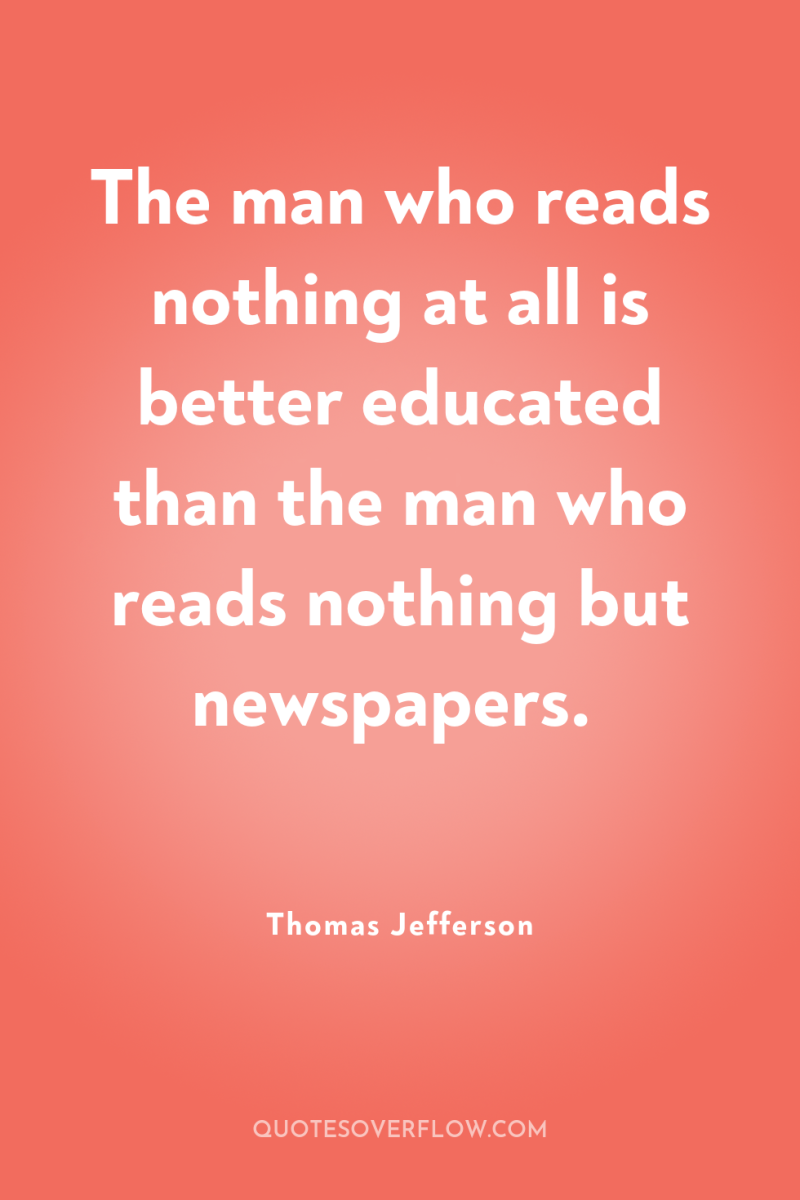
18
The man who reads nothing at all is better educated than the man who reads nothing but newspapers.Thomas Jefferson
19
I was driven to go into book writing by the very nature of journalism and blogging. Both are ephemeral. Journalists and bloggers can have humongous egos. But in the end, what they write is really a passing show. I wanted something more lasting – a record of sorts, something people can look back to and relish again like hot, home—brewed coffee.Barista Uno
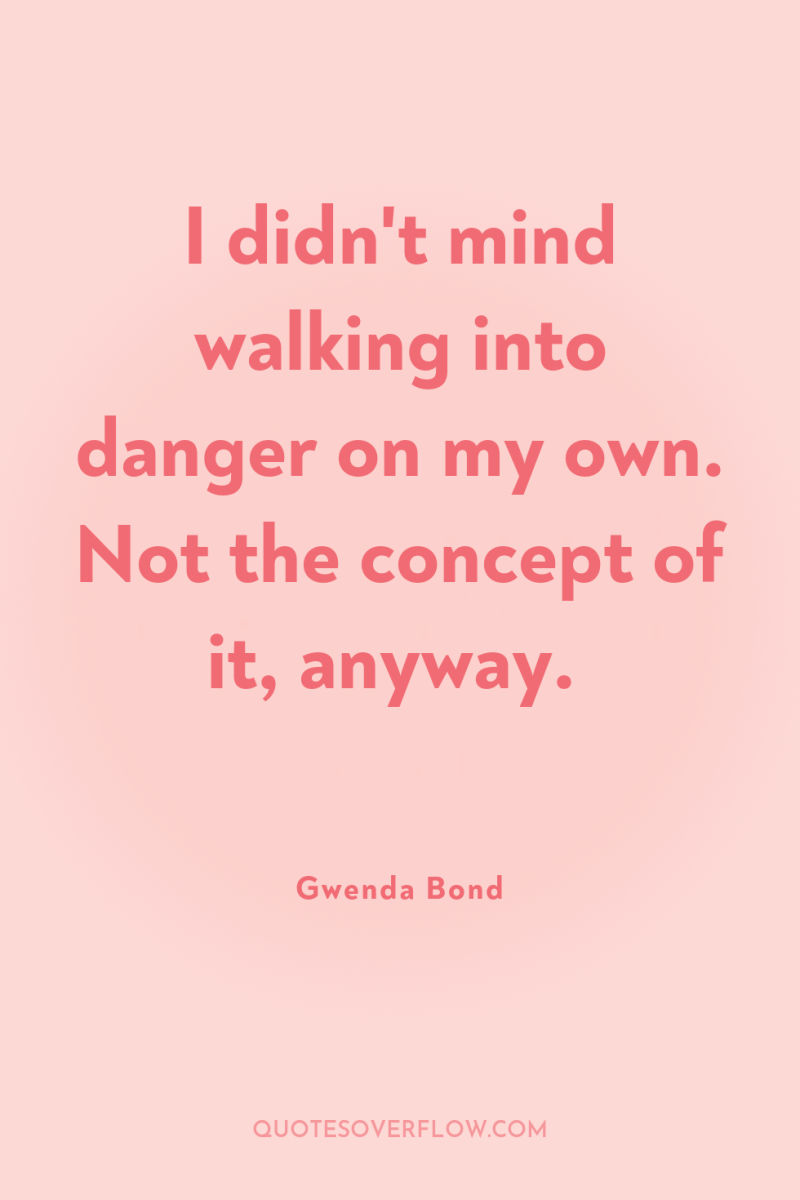
20
I didn't mind walking into danger on my own. Not the concept of it, anyway.Gwenda Bond
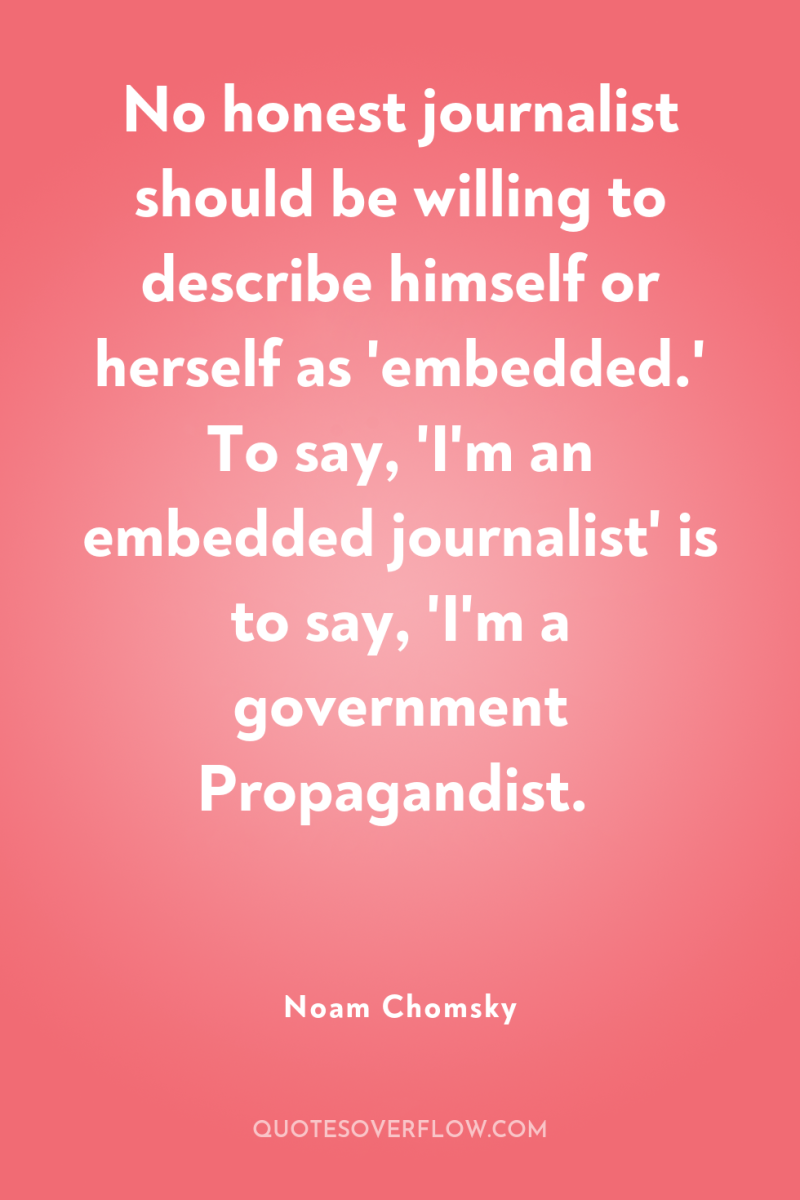
21
No honest journalist should be willing to describe himself or herself as 'embedded.' To say, 'I'm an embedded journalist' is to say, 'I'm a government Propagandist.Noam Chomsky
22
All you have to do [to win a Pulitzer Prize] is spend your life running from one awful place to another, write about every horrible thing you see. The civilized world reads about it, then forgets it, but pats you on the head for doing it and gives you a reward as appreciation for changing nothing.David Baldacci
23
How paltry are the traces left behind by a life, even one concentrated around those supposed things of permanence called words. We spend our time upon the earth and then disappear, and only one one-thousandth of what we were lasts. We send all those bottles out into the ocean and so few wash up on shore.John Darnton
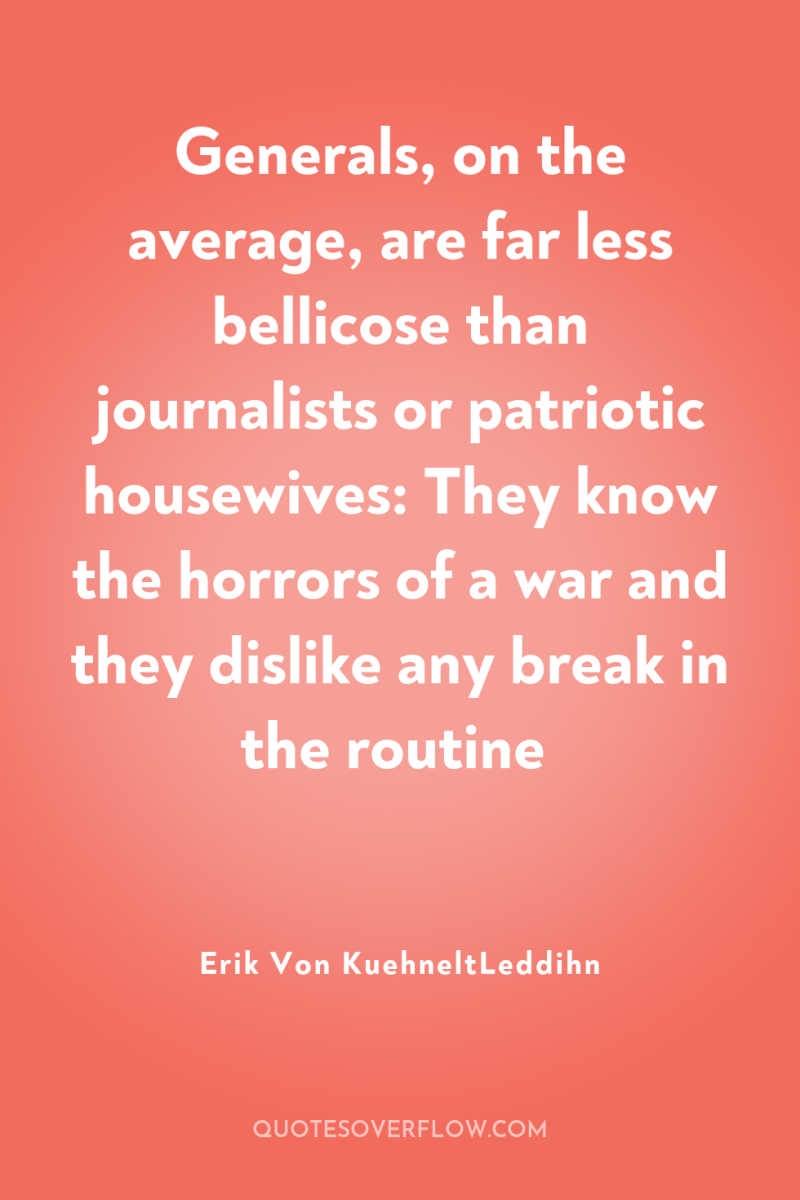
24
Generals, on the average, are far less bellicose than journalists or patriotic housewives: They know the horrors of a war and they dislike any break in the routineErik Von KuehneltLeddihn
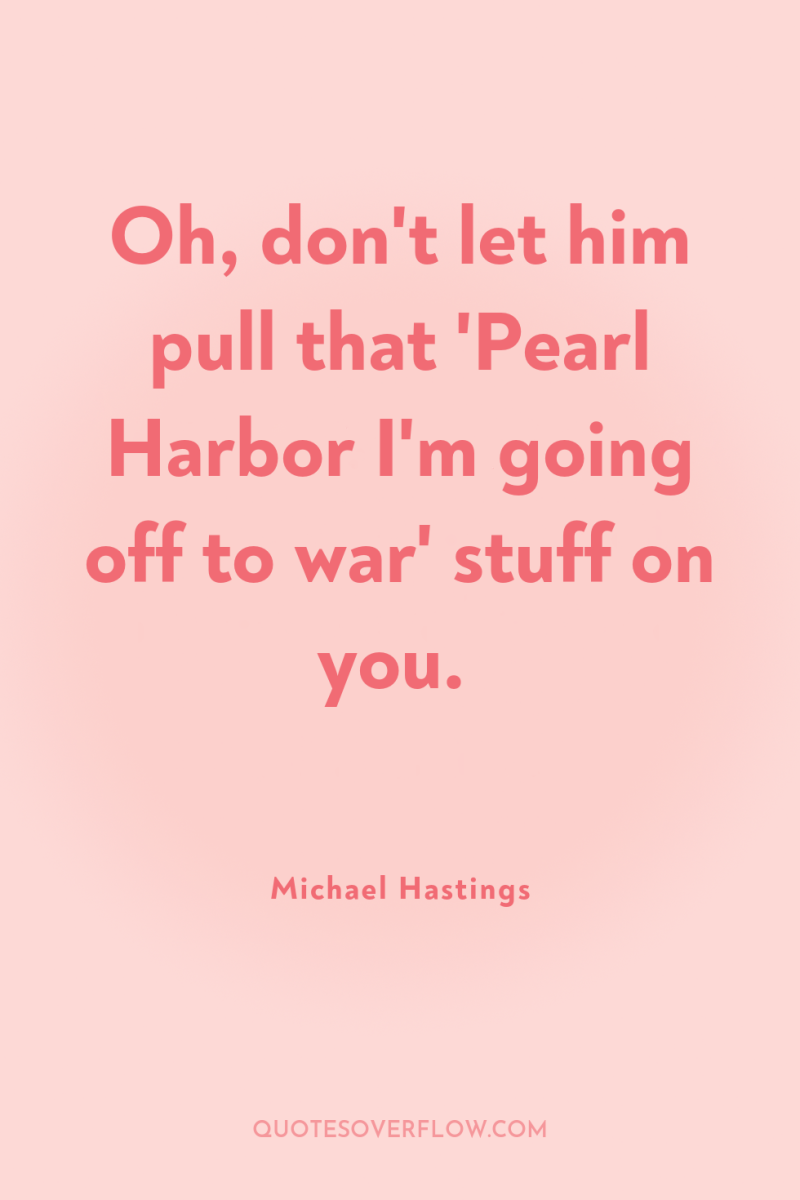
25
Oh, don't let him pull that 'Pearl Harbor I'm going off to war' stuff on you.Michael Hastings
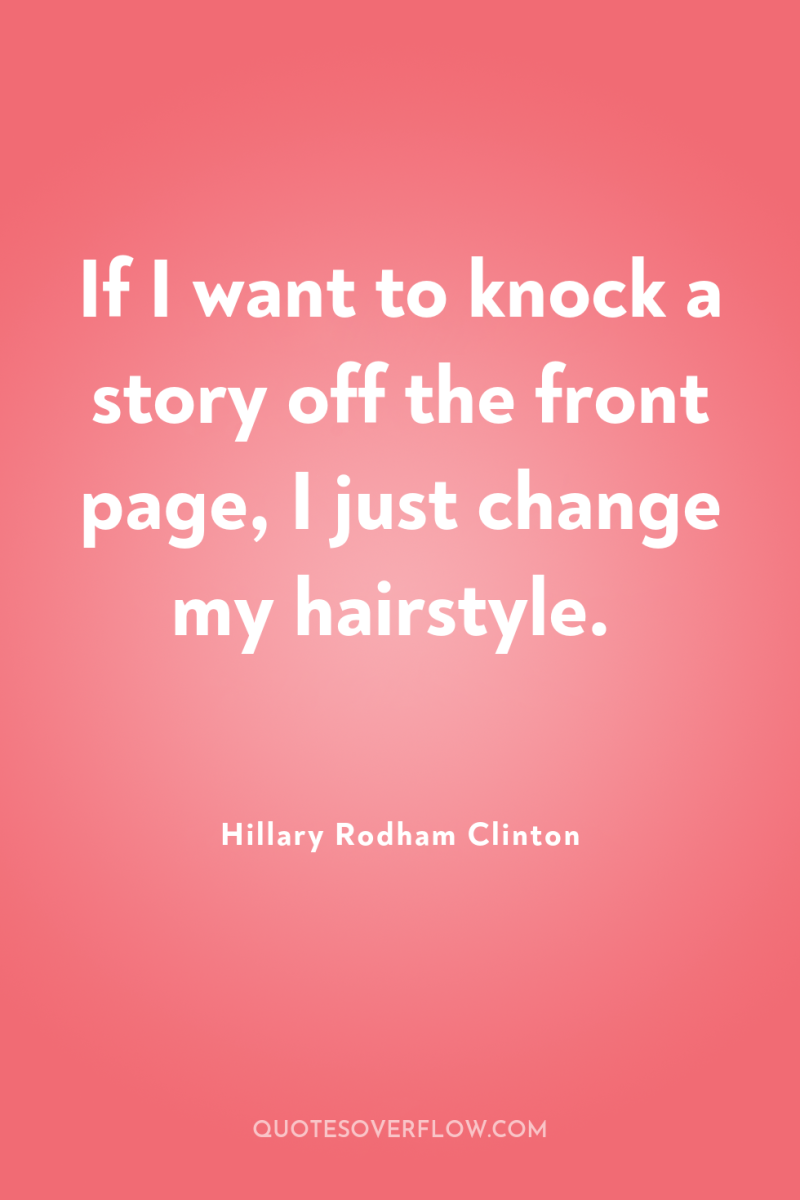
26
If I want to knock a story off the front page, I just change my hairstyle.Hillary Rodham Clinton
27
I think being a liberal, in the true sense, is being nondoctrinaire, nondogmatic, non-committed to a cause - but examining each case on its merits. Being left of center is another thing; it's a political position. I think most newspapermen by definition have to be liberal; if they're not liberal, by my definition of it, then they can hardly be good newspapermen. If they're preordained dogmatists for a cause, then they can't be very good journalists; that is, if they carry it into their journa.Walter Cronkite
28
So much for Objective Journalism. Don't bother to look for it here--not under any byline of mine; or anyone else I can think of. With the possible exception of things like box scores, race results, and stock market tabulations, there is no such thing as Objective Journalism. The phrase itself is a pompous contradiction in terms.Hunter S. Thompson
29
Don't tell me about the Press. I know *exactly* who reads the papers. The Daily Mirror is read by the people who think they run the country. The Guardian is read by people who think they *ought* to run the country. The Times is read by the people who actually *do* run the country. The Daily Mail is read by the wives of the people who run the country. The Financial Times is read by people who *own* the country. The Morning Star is read by people who think the country ought to be run by *another* country. The Daily Telegraph is read by the people who think it is.'" Prime Minister, what about the people who read The Sun?""Sun readers don't care *who* runs the country - as long as she's got big tits.Antony Jay
30
Many journalists now are no more than channelers and echoers of what George Orwell called the 'official truth'. They simply cipher and transmit lies. It really grieves me that so many of my fellow journalists can be so manipulated that they become really what the French describe as 'functionaires', functionaries, not journalists. Many journalists become very defensive when you suggest to them that they are anything but impartial and objective. The problem with those words 'impartiality' and 'objectivity' is that they have lost their dictionary meaning. They've been taken over.. [they] now mean the establishment point of view.. Journalists don't sit down and think, 'I'm now going to speak for the establishment.' Of course not. But they internalise a whole set of assumptions, and one of the most potent assumptions is that the world should be seen in terms of its usefulness to the West, not humanity.John Pilger
31
I knew that a historian (or a journalist, or anyone telling a story) was forced to choose, out of an infinite number of facts, what to present, what to omit. And that decision inevitably would reflect, whether consciously or not, the interests of the historian.Howard Zinn
![[O]nce demagogy and falsehoods become routine, there isn’t much for...](https://cdn.quotesoverflow.com/file/quotesoverflow/images/once-demagogy-and-falsehoods-become-routine367475562692-1200.webp)
32
[O]nce demagogy and falsehoods become routine, there isn’t much for the political journalist to do except handicap the race and report on the candidate’s mood.George Packer
33
Bernstein was impressed by Sloan's thoughtfulness. Sloan seemed convinced that the President, whom he very much wanted to see re-elected, had known nothing of what happened before June 17; but he was as sure that Nixon had been ill-served by his surrogates before the bugging and had been put in increasing jeopardy by them ever since. Sloan believed that the prosecutors were honest men, determined to learn the truth, but there were obstacles they had been unable to overcome. He couldn't tell whether the FBI had been merely sloppy or under pressure to follow procedures that would impede an effective investigation. He believed the press was doing its job, but, in the absence of candor from the committee, it had reached unfair conclusions about some people. Sloan himself was a prime example. He was not bitter, just disillusioned. All he wanted now was to clean up his legal obligations - testimony in the trial and in the civil suit - and leave Washington forever. He was looking for a job in industry, a management position, but it was difficult. His name had been in the papers often. He would not work for the White House again even if asked to come back. He wished he were in Bernstein's place, wished he could write. Maybe then he could express what had been going through his mind. Not the cold, hard facts of Watergate necessarily - that wasn't really what was important. But what it was like for young men and women to come to Washington because they believed in something and then to be inside and see how things worked and watch their own ideals disintegrate.Carl Bernstein
34
He believed the press was doing its job, but, in the absence of candor from the committee, it had reached unfair conclusions about some people. Sloan himself was a prime example. He was not bitter, just disillusioned. All he wanted now was to clean up his legal obligations - testimony in the trial and in the civil suit - and leave Washington forever. He was looking for a job in industry, a management position, but it was difficult. His name had been in the papers often. He would not work for the White House again even if asked to come back. He wished he were in Bernstein's place, wished he could write. Maybe then he could express what had been going through his mind. Not the cold, hard facts of Watergate necessarily - that wasn't really what was important. But what it was like for young men and women to come to Washington because they believed in something and then to be inside and see how things worked and watch their own ideals disintegrate.Carl Bernstein
35
But when our elected officials and our political campaign become entirely untethered to reason and facts and analysis, when it doesn’t matter what's true and what's not, that makes it all but impossible for us to make good decisions on behalf of future generations. It threatens the values of respect and tolerance that we teach our children and that are the source of America’s strength. It frays the habits of the heart that underpin any civilized society -- because how we operate is not just based on laws, it's based on habits and customs and restraint and respect.Barack Obama
36
A good businessman must have nose for business the same way a journalist has nose for news. In places where people see a lot of obstacles, I see a lot of opportunities. A good businessman sees where others don’t see.Orji Uzor Kalu
37
To read a newspaper is to refrain from reading something worthwhile. [....] The first discipline of education must therefore be to refuse resolutely to feed the mind with canned chatter.Aleister Crowley
38
News is only the first rough draft of history.Alan Barth
39
Mayor Walmsley is using the typical Jim Crow manipulation tactics to deflect the blame and guilt. He's a classic racist politician with an ulterior motive, ” says Ora.Shaune Bordere
40
Exposing corruption, brandishing truth.Chris Cleave
41
I want to be a journalist again. I want to make a difference in the world.Chris Cleave
42
However let's turn the coin, what if we choose not to broadcast the bad news but choose to broadcast mostly good news? How would this affect our life?Tracy Sillato
43
One thing I learned as a journalist is that there is at least one disgruntled person in every workplace in America -- and at least double that number with a conscience. Hard as they try, they simply can't turn their heads away from an injustice when they see one taking place.Michael Moore
44
I earned a mater's degree in journalism and took the first job offered, as a sports writer. Instead of chasing my own fame, I wrote about famous athletes chasing theirs.Mitch Albom
45
Finally, I applied to one of my roommates, more sagacious than the rest, for advice. Dave, I said. I’m broke and without prospects. I’ve blown my GI Bill on flying lessons. I can’t hide out here in college much longer. What should I do? Well, he said, at this crucial juncture you need to coldly appraise yourself. “I’ve only known you these few short years, but it strikes me you wouldn’t be good for anything important; I’d have to say you’re lazy, self-absorbed, glib and facetious, always ready to mock the suggestions of others, but never offering anything positive of your own. Intellectually shallow, no tap root anywhere, spiritually neutered, without feeling or compassion, unsteady of focus, lacking the fortitude for the long pull, with no fixed belief in anything.” I shook his hand and thanked him. The acuity of his analysis made my path clear. My only hope lay in daily journalism. .Phil Garlington
46
We are beckoned to see the world through a one-way mirror, as if we are threatened and innocent and the rest of humanity is threatening, or wretched, or expendable. Our memory is struggling to rescue the truth that human rights were not handed down as privileges from a parliament, or a boardroom, or an institution, but that peace is only possible with justice and with information that gives us the power to act justly.John Pilger
47
The only private sector industry where employees work with their lives on stake for the interest of common people is media industry.Amit Kalantri
48
Frosh (2002) has suggested that therapeutic spaces provide children and adults with the rare opportunity to articulate experiences that are otherwise excluded from the dominant symbolic order. However, since the 1990s, post-modern and post-structural theory has often been deployed in ways that attempt to ‘manage’ from; afar the perturbing disclosures of abuse and trauma that arise in therapeutic spaces (Frosh 2002). Nowhere is this clearer than in relation to organised abuse, where the testimony of girls and women has been deconstructed as symptoms of cultural hysteria (Showalter 1997) and the colonisation of women’s minds by therapeutic discourse (Hacking 1995). However, behind words and discourse, ‘a real world and real lives do exist, howsoever we interpret, construct and recycle accounts of these by a variety of symbolic means’ (Stanley 1993: 214). Summit (1994: 5) once described organised abuse as a ‘subject of smoke and mirrors’, observing the ways in which it has persistently defied conceptualisation or explanation. Explanations for serious or sadistic child sex offending have typically rested on psychiatric concepts of ‘paedophilia’ or particular psychological categories that have limited utility for the study of the cultures of sexual abuse that emerge in the families or institutions in which organised abuse takes pace. For those clinicians and researchers who take organised abuse seriously, their reliance upon individualistic rather than sociological explanations for child sexual abuse has left them unable to explain the emergence of coordinated, and often sadistic, multi–perpetrator sexual abuse in a range of contexts around the world. .Michael Salter
49
In almost all other professions a man must be able to observe carefully and report accurately what he has seen. Those qualifications are unnecessary for journalists, however, since their job is to write sensational stories that sell newspapers.Robert Anton Wilson
50
The issue which faced the jury was this: was Sutcliffe a clever criminal, aware of what he was doing and determined to avoid capture?. . In a sense, it was the wrong question. The battle that was fought out in court - the mad/bad dichotomy - both substitutes for and obscures the real dilemma raised by the Yorkshire Ripper case: is Sutcliffe a one-off, su generis as I have heard one psychiatrist describe him, someone who stands outside our culture and has no relation to it? Those who assert that Sutcliffe is mad are in essence saying yes to this question; madness is a closed category, one over which we have no control and for which we bear no responsibility. The deranged stand apart from us; we cannot be blamed for their insanity. Thus the urge to characterize Sutcliffe as mad has powerful emotional origins; it has as much to do with how we see ourselves and the society in which we live.. It is a distancing mechanism, a way of establishing a comforting gulf between ourselves and a particularly unacceptable criminal.Joan Smith
51
In early 1970, Newsweek's editors decided that the new women's liberation movement deserved a cover story. There was one problem, however: there were no women to write the piece.Lynn Povich
52
Time dims memory. But not that kind. Somewhere in a corner of the brain, one little cell never forgets. It keeps the song that, heard again, recreates the room, the person, the moment. It preserves the phrase or the laugh or the gesture that resurrects a friend long gone. It knows precisely where you were and what you were doing when you heard about Pearl Harbor if you're old enough, or Kennedy's assassination, or Martin Luther King's, or the Challenger explosion. Every detail is frozen in memory, despite all the years. It keeps the innocuous question, too. The question that sometime later, when all the synapses are working, produces the epiphany, the moment when you're driving along and you realize that finally you understand. And why did it take you so long?.Kay Mills
53
I have seen enormous changes. I have not seen enough change. I, too, can hardly wait.Kay Mills
54
The fault I find with our journalism is that it forces us to take an interest in some fresh triviality or other every day, whereas only three or four books in a lifetime give us anything that is of real importance.Marcel Proust
55
People nowadays talk about the world's problems like they're reading lines off a teleprompter. They recite what they're told and echo it without thinking. It has become easier to divide people than to unify them, and to blind them than to give them vision. We are no longer unified like a bowl of Cheerios. Instead, we have become as segregated as a box of Lucky Charms. Every day we see the same leprechauns on TV acting like they're the experts of everything.Suzy Kassem
56
Journalism, look you, is the religion of modern society.Unknown
57
Shall we go?' he murmured, perhaps regretting his decision to show me his army of plastic cartoon figurines.Jon Ronson
58
Speculation was now news. News had been confused with fact. Fact had been replaced by expert opinion. People had been replaced by their biographies. Ability had been replaced by disability. Thinking had been replaced by psychology. History had been reduced to story. And while the news media pumped out a new story every week on things that could kill you, Hollywood simultaneously created stories that showed that everything could be prevailed over. Meaning, he said, was so malleable that it could be turned inside out, and no one would know the difference–and it would–and, just like the universe that had expanded to its maximum size, everything that had ever been would happen in reverse and revert back to its original form until existence would disappear without leaving a trace of itself as the Big Bang backfired.John M. Keller
59
Zombies are familiar characters in philosophical thought experiments. They are like people in every way except they have no internal experience.. If there are enough zombies recruited into our world, I worry about the potential for a self-fulfilling prophecy. Maybe if people pretend they are not conscious or do not have free will - or that the cloud of online people is a person; if they pretend there is nothing special about the perspective of the individual - then perhaps we have the power to make it so. We might be able to collectively achieve antimagic. Humans are free. We can commmit suicide for the benefit of a Singularity. We can engineer our genes to better support an imaginary hive mind. We can make culture and journalism into second-rate activities and spend centuries remixing the detritus of the 1960s and other eras from before individual creativity went out of fashion. Or we can believe in ourselves. By chance, it might turn out we are real.Jaron Lanier
60
It is not commercial success but originality and proof of autonomy which are admired.Angela Phillips
61
Many things in this period have been hard to bear, or hard to take seriously. My own profession went into a protracted swoon during the Reagan-Bush-Thatcher decade, and shows scant sign of recovering a critical faculty–or indeed any faculty whatever, unless it is one of induced enthusiasm for a plausible consensus President. (We shall see whether it counts as progress for the same parrots to learn a new word.) And my own cohort, the left, shared in the general dispiriting move towards apolitical, atonal postmodernism. Regarding something magnificent, like the long-overdue and still endangered South African revolution (a jagged fit in the supposedly smooth pattern of axiomatic progress), one could see that Ariadne’s thread had a robust reddish tinge, and that potential citizens had not all deconstructed themselves into Xhosa, Zulu, Cape Coloured or ‘Eurocentric’; had in other words resisted the sectarian lesson that the masters of apartheid tried to teach them. Elsewhere, though, it seemed all at once as if competitive solipsism was the signifier of the ‘radical’; a stress on the salience not even of the individual, but of the trait, and from that atomization into the lump of the category. Surely one thing to be learned from the lapsed totalitarian system was the unwholesome relationship between the cult of the masses and the adoration of the supreme personality. Yet introspective voyaging seemed to coexist with dull group-think wherever one peered about among the formerly ‘committ.Christopher Hitchens
62
Here we are in the century of information, that is to say the unformed. Every kind of literature will be journalistic, with a science for ballast.Julien Torma
63
All photos speak a thousand words. This one contained a library.Rivera Sun
64
When words lose their meaning and their capacity to bind those who use them, neither democracy nor the rule of law can long survive.Austin Sarat
65
Allow your mind to be still and rest in His presence.Rachel K Kidder
66
We had all opted to take City's financial reporting course work, which, in theory, meant we wanted to write about stock prices and corporate takeovers. That, of course, was a joke. No one still in their twenties, and broke, goes into journalism to write about money–a subject in which they still have zero practical experience.Chris Ayres
67
Innovation and disruption are ideas that originated in the arena of business but which have since been applied to arenas whose values and goals are remote from the values and goals of business. People aren’t disk drives. Public schools, colleges and universities, churches, museums, and many hospitals, all of which have been subjected to disruptive innovation, have revenues and expenses and infrastructures, but they aren’t industries in the same way that manufacturers of hard-disk drives or truck engines or drygoods are industries. Journalism isn’t an industry in that sense, either. Doctors have obligations to their patients, teachers to their students, pastors to their congregations, curators to the public, and journalists to their readers--obligations that lie outside the realm of earnings, and are fundamentally different from the obligations that a business executive has to employees, partners, and investors. Historically, institutions like museums, hospitals, schools, and universities have been supported by patronage, donations made by individuals or funding from church or state. The press has generally supported itself by charging subscribers and selling advertising. (Underwriting by corporations and foundations is a funding source of more recent vintage.) Charging for admission, membership, subscriptions and, for some, earning profits are similarities these institutions have with businesses. Still, that doesn’t make them industries, which turn things into commodities and sell them for gain.Jill Lepore
68
You need to know the constituency you belong to...and that is revealed by your constituents. When your constituents are speaking in public and making of stories, your constituency can be "journalism".Israelmore Ayivor
69
I also often ask my guests about what they consider to be their invisible weaknesses and shortcomings. I do this because these are the characteristics that define us no less than our strengths. What we feel sets us apart from other people is often the thing that shapes us as individuals. This may be especially true of writers and actors, many of whom first started to develop their observational skills as a result of being sidelined from typical childhood or adolescent activities because of an infirmity or a feeling of not fitting in. Or so I’ve come to believe from talking to so many writers and actors over the years.Terry Gross
70
Albert Camus did not know he was summing up modern photojournalism when he wrote:" Will I kill myself or have a cup of coffeeSacha Hartgers
71
People who are drawn to journalism are usually people who, because of their cynicism or emotional detachment or reserve or whatever, are incapable of being anything but witnesses to events. Something prevents them from becoming involved, committed, and allows them to remain separate.Nora Ephron
72
If I beat my grandmother to death to-morrow in the middle of Battersea Park, you may be perfectly certain that people will say everything about it except the simple and fairly obvious fact that it is wrong. Some will call it insane; that is, will accuse it of a deficiency of intelligence. This is not necessarily true at all. You could not tell whether the act was unintelligent or not unless you knew my grandmother. Some will call it vulgar, disgusting, and the rest of it; that is, they will accuse it of a lack of manners. Perhaps it does show a lack of manners; but this is scarcely its most serious disadvantage. Others will talk about the loathsome spectacle and the revolting scene; that is, they will accuse it of a deficiency of art, or æsthetic beauty. This again depends on the circumstances: in order to be quite certain that the appearance of the old lady has definitely deteriorated under the process of being beaten to death, it is necessary for the philosophical critic to be quite certain how ugly she was before. Another school of thinkers will say that the action is lacking in efficiency: that it is an uneconomic waste of a good grandmother. But that could only depend on the value, which is again an individual matter. The only real point that is worth mentioning is that the action is wicked, because your grandmother has a right not to be beaten to death. But of this simple moral explanation modern journalism has, as I say, a standing fear. It will call the action anything else–mad, bestial, vulgar, idiotic, rather than call it sinful. .G.k. Chesterton
73
A conscious act grew out of this by the time I began writing stories: getting my distance, a prerequisite of my understanding of human events, is the way I begin work. Just as, of course, it was an initial step when, in my first journalism job, I stumbled into making pictures with a camera. Frame, proportion, perspective, the values of light and shade; all are determined by the distance of the observing eye.Eudora Welty
74
It is the vice of the journalist, I once wrote, to think that history can always be reduced to experience, and of the scholar to think that experience can always be reduced to history. History and experience are far more frequently out of sync, or running on parallel tracks.Adam Gopnik
75
If we had met five years ago, you wouldn't have found a more staunch defender of the newspaper industry than me .. I was winning awards, getting raises, lecturing college classes, appearing on TV shows, and judging journalism contests. So how could I possibly agree with people like Noam Chomsky and Ben Bagdikian, who were claiming the system didn't work, that it was steered by powerful special interests and corporations, and existed to protect the power elite? And then I wrote some stories that made me realize how sadly misplaced my bliss had been. The reason I'd enjoyed such smooth sailing for so long hadn't been, as I'd assumed, because I was careful and diligent and good at my job .. The truth was that, in all those years, I hadn't written anything important enough to suppress ..Gary Webb
76
It is nine o'clock, and London has breakfasted. Some unconsidered tens of thousands have, it is true, already enjoyed with what appetite they might their pre-prandial meal; the upper fifty thousand, again, have not yet left their luxurious couches, and will not breakfast till ten, eleven o'clock, noon; nay, there shall be sundry listless, languid members of fast military clubs, dwellers among the tents of Jermyn Street, and the high-priced second floors of Little Ryder Street, St. James's, upon whom one, two, and three o'clock in the afternoon shall be but as dawn, and whose broiled bones and devilled kidneys shall scarcely be laid on the damask breakfast-cloth before Sol is red in the western horizon. I wish that, in this age so enamoured of statistical information, when we must needs know how many loads of manure go to every acre of turnip-field, and how many jail-birds are thrust into the black hole per mensem for fracturing their pannikins, or tearing their convict jackets, that some M'Culloch or Caird would tabulate for me the amount of provisions, solid and liquid, consumed at the breakfasts of London every morning. I want to know how many thousand eggs are daily chipped, how many of those embryo chickens are poached, and how many fried; how many tons of quartern loaves are cut up to make bread-and-butter, thick and thin; how many porkers have been sacrificed to provide the bacon rashers, fat and streaky ; what rivers have been drained, what fuel consumed, what mounds of salt employed, what volumes of smoke emitted, to catch and cure the finny haddocks and the Yarmouth bloaters, that grace our morning repast. Say, too, Crosse and Blackwell, what multitudinous demands are matutinally made on thee for pots of anchovy paste and preserved tongue, covered with that circular layer - abominable disc! - of oleaginous nastiness, apparently composed of rancid pomatum, but technically known as clarified butter, and yet not so nasty as that adipose horror that surrounds the truffle bedecked pate de foie gras. Say, Elizabeth Lazenby, how many hundred bottles of thy sauce (none of which are genuine unless signed by thee) are in request to give a relish to cold meat, game, and fish. Mysteries upon mysteries are there connected with nine o'clock breakfasts.George Augustus Sala
77
Until he (Time's founder Henry Luce) arrived, news was crime and politics.David Halberstam
78
As a journalist, I can also now understand his (Patrick O'Brian's)idea that the Q&A is not particularly civilized – let alone a sports media press scrum. The formats don’t necessarily further understanding between two people. It is not always true conversation – a discussion that unearths nuggets of insight. It too often seems like interviewers are running through a pre-fab checklist, looking for a Tweetable quote, trolling for a gaffe, or ticking off pre-conceived points like those on a medical checklist at the doctor’s office. It can feel invasive, like a trip to the proctologist – in front of an audience.Knute Berger
79
Though anger seems a pessimistic response to a situation, it is at root a symptom of hope: the hope that the world can be better than it is. The man who shouts every time he loses his house keys is betraying a beautiful but rash faith in a universe in which keys never go astray. The woman who grows furious every time a politician breaks an election promise reveals a precariously utopian belief that elections do not involve deceit. The news shouldn’t eliminate angry responses; but it should help us to be angry for the right reasons, to the right degree, for the right length of time — and as part of a constructive project. And whenever this isn’t possible, then the news should help us with mourning the twisted nature of man and reconciling us to the difficulty of being able to imagine perfection while still not managing to secure it — for a range of stupid but nevertheless unbudgeable reasons.Alain De Botton
80
I don’t know how a reporter would ever understand a politician. Your job is supposed to be about finding the truth and enlightening people. Right? A politician’s job is about hiding the truth and fooling people. Right? You want us to be better informed so we get smarter. They think we’re dumb and it’s to their advantage to keep us that way.Dan Groat
81
Indeed, to this day, I think if you blame everything on the government, you're not just wrong, you're being reckless. It's as silly as blaming everything on the Freemasons, or the Illuminati, or insert-bad-guy-here. But I do believe that someone must ask the hard questions, especially of our elected officials as well as powerful men who become members of so-called secret societies. Remember: Governments don't lie. People lie. And if you want the real story, you need to find out more about those people.Brad Meltzer
82
I wanted to make people think, to open their minds, to give them a full picture of what was happening in Iraq so they can decide whether they supported our presence there.Lynsey Addario
83
Journalism is not like fiction and will never be. In fiction, you can feed people with lies, yet at the end of the reading, people still live the same life - go to work, eat, come back home, and sleep - nothing really changes aside from, at the very least, their perception of the world. But, things are different in journalism. You tell people a barefaced life, they will believe it, and something is going to happen. People will promptly respond to what they believe is true because it relates to their life, and we take life seriously, don't we? .Aishah Madadiy
84
If he (John Adams) could not control events, he could at least record them for posterity — perhaps the ultimate form of control.Joseph J. Ellis
85
Everything is in the way the material is composed.Joseph OConnor
86
I was not born to wait.Gwenda Bond
87
Someone else deciding what was too dangerous for me to be involved in or pursue had never stopped me yet.Gwenda Bond
88
You see, Monsieur, it's worth everything, isn't it, to keep one's intellectual liberty, not to enslave one'spowers of appreciation, one's critical independence? It was because of that that I abandoned journalism, andtook to so much duller work: tutoring and private secretaryship. There is a good deal of drudgery, of course;but one preserves one's moral freedom, what we call in French one's quant a soi. And when one hears goodtalk one can join in it without compromising any opinions but one's own; or one can listen, and answer itinwardly. Ah, good conversation--there's nothing like it, is there? The air of ideas is the only air worthbreathing. And so I have never regretted giving up either diplomacy or journalism--two different forms of thesame self-abdication." He fixed his vivid eyes on Archer as he lit another cigarette. "Voyez-vous, Monsieur, to be able to look life in the face: that's worth living in a garret for, isn't it? But, after all, one must earnenough to pay for the garret; and I confess that to grow old as a private tutor--or a `private' anything--is almostas chilling to the imagination as a second secretaryship at Bucharest. Sometimes I feel I must make a plunge:an immense plunge. Do you suppose, for instance, there would be any opening for me in America-- in NewYork? .Edith Wharton
89
All governments lie, as I.F. Stone pointed out, including Israel and Hamas. But Israel engages in the kinds of jaw-dropping lies that characterize despotic and totalitarian regimes. It does not deform the truth; it inverts it. It routinely paints a picture for the outside world that is diametrically opposed to reality. And all of us reporters who have covered the occupied territories have run into Israel’s Alice-in-Wonderland narratives, which we dutifully insert into our stories–required under the rules of American journalism–although we know they are untrue.Chris Hedges
90
This 'vampire' stuff is to stay right in this room. Until we have the assailant in custody we say nothing about these girls being drained of blood. No more rumors. No reports in the papers, " he added, looking directly at me and ignoring my colleague from the opposition press. "The official opinion at this time is that the cause of death is 'undetermined and under investigation'. We don't want to start a panic. It's bad for police operations. It's bad for the people. And it's had for business.Jeff Rice
91
Once upon a time the world was a realm of unanswered questions and there was room in it for poetry. Man stood beneath the sky and he asked “why?”. And his question was beautiful. The new world will be a place of answers and no questions, because the only questions left will be answered by computers, because only computers will know what to ask. Perhaps that is the way it has to be.James Cameron
92
The Society of Professional Journalists believes that "public enlightenment is the forerunner of justice and the foundation of democracy." If that is so, can justice or democracy be secure in a media world where public enlightenment has been supplanted by the superficial?Larry J. Schweiger
93
If democracy is the voice of the people, then the AP is its stenographer.Peter Arnett
94
This was the first time I had not just rushed in and followed my instincts, and it wasn't working out. I was beginning to actively regret it.Gwenda Bond
95
In the English language, it all comes down to this: Twenty-six letters, when combined correctly, can create magic. Twenty -six letters form the foundation of a free, informed society.John Grogan
96
In the developed countries of the capitalist world, the mass media are beginning to become businesses, and huge businesses at that. The freedom of journalists is now becoming, in most cases, a very relative thing: it ends where the interests of the business begin... In socialist areas, it is enough to recall that the means of social communication are the monopoly of the party.Unknown
97
In some respect Journalism is like science, the best ideas were one that survived and strengthened by opposition.Ian Mcewan
98
It is in the combination of words and visuals that the magic of understanding often happens.Alberto Cairo
99
Sometimes, it is not you who finds good ideas when you are seeking them. Instead, good ideas find you in the most unexpected circumstances.Alberto Cairo
100
I would tell young journalists to be brave and go against the tide. When everyone else is relying on the internet, you should not; when nobody's walking, you should walk; when few people are reading profound books, you should read.. rather than seeking a plusher life you should pursue some hardship. Eat simple food. When everyone's going for quick results, pursue things of lasting value. Don't follow the crowd; go in the opposite direction. If others are fast, be slow. -- Jin Yongquan .Judy Polumbaum